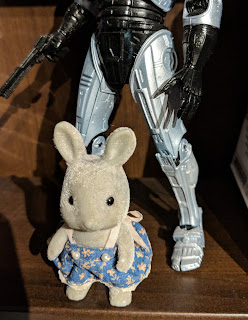Names Have Power
So we're told by fairy tales, and authors of novels spend plenty of time coming up with names for their characters. Names are tricky, and I'm sure different readers are more or less forgiving of different naming conventions.
I can be forgiving of many naming sins if I like the story enough, but here are a few starting rules, starting with the most important:
Names must be pronounceable.
Simple, right? I just need to be able to read the name and have some idea of how it would sound. I don't even have to be correct in my pronunciation. I read about Eilonwy (The Prydain Chronicles) for a long time before I realized I was mentally pronouncing her name wrong.
Quit it already with the weird spelling/punctuation!
A little of this goes a long way. A few works get a pass for when they were written, or if it's not too pervasive. Mercedes Lackey popularized the abuse of apostrophes in the Valdemar books, (Shin'a'in, Ma'ar, k'Whatever) but at least she mostly used it to distinguish between fictional races that used them or that didn't. Odd or non-English punctuation and odd spelling can be used to good effect, (like !Xabbu, Otherlands, or Trurl and Klapaucius, The Cyberiad) but only by seasoned professionals, please.
Limit the number of permutations for any one character
If your main character is named Kylara Vatta (Vatta's War), and her friends call her Ky, her relatives, Kylara, and her crew Captain Vatta, that's fine. You might be able to add one more nickname on top of that, since she's the main protagonist. But if all your characters have, say, a first name, a nickname, a family name, a true name and a code name, I'm going to get lost fairly quickly.
Names should usually be in tone.
Not an unbreakable rule, but a relative one. A serious book shouldn't have names that are too ridiculous, overtly modern names better have a good reason to be in a medieval setting, etc.
Silly, elaborate or simple names can sometimes be altered just by good writing. Fleming, after all, famously chose James Bond as the name for his super-spy because it was the plainest, least intrinsically “cool” name he could find. It didn't stay that way, obviously.
There are further stylistic guidelines for particular genres, but they are just that, guidelines, which a talented author can feel free to disregard.
If you've read my recent review of A Mighty Fortress, you know why I'm harping on this now: David Weber.
His Safehold series has just about scraped raw my last nerve as far as names go. He breaks every rule, not in a good way. There are too many consonants in most of the names, making them nigh-impossible to read, much less pronounce, much less remember. Many of the minor characters have three or four names, including a first name, a surname, and a landed title. This makes it extremely difficult to remember some of these guys when I don't see them for a while, or to identify them as unique characters.
A named character died in the climax of the most recent book, and I have no idea if he was in any of the previous books; he just blends into the fog of similarly named gentlemen. This problem is exacerbated by the fact that most of the title names are descriptive, often places: Green Mountain, Stone Hollow, WaveThunder. I think one of those I just made up, but I'm not sure. Oh, and as for tone? The main character is called Merlin ironically, birth name Nimue, unironically. I'm mostly over the silliness of it, but still. Even then, many of these problems wouldn't be so bad if there weren't so many damn characters to juggle. There are 22 pages in the character list – single spaced.
I know what Weber was trying to do. He took “normal” modern names and spun them through a few hundred years of pseudo-medieval society. But that somehow turned “normal” names into impenetrable mouthfuls that look like bad fantasy names. Some changes aren't so bad: Brian to Bryahn, Michael to Maikel. Some just break my brain. Lywys? Hauwerd? And some I just have to stare at until they make sense. Ahnzhelyk. Look again: Ahnzhelyk. What a mouthful. After slowly and painfully sounding it out, I managed to resolve this one into Angelic(a), but it wasn't easy.
I'd like to contrast this with one of my favorite examples of complicated naming: Memory, Sorrow and Thorn, by Tad Williams. This series also has a great deal of characters, many of which have fantasy-esque turns on “normal” names. Why is it better? The different countries have characters with different-sounding names (and yes, one of those involves apostrophes - it's not perfect). The character appendix is separated by country/faction. (This would be so helpful in the Safehold books.) Examples of some more legible 'new' names: Simon to Seoman (actually goes by either), Joshua to Josua, Rachel (no change), Elijah to Elias. Also, not ALL the names are modified names, many are original. A few of the main characters have more than one name, but it doesn't get too complicated: Simon, Seoman, Simon Snowlock, or Josua, Prince Josua or Josua Lackhand
I respect Weber's idea, but it really didn't work. Williams has a few near misses with names that skirt the edge of ridicule, but overall handles it much better. (Look at his most awkward, the name Pryrates, for the evil priest in MS&T, is it as bad than that of the evil priest in Safehold: Zhaspahr Clyntahn?)



Comments
Post a Comment
FYI: Most comments are moderated, and will not appear immediately.